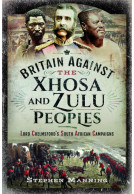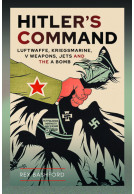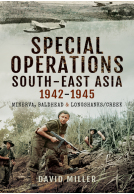Britain at War with the Asante Nation 1823-1900 (Hardback)
'The White Man's Grave'
Imprint: Pen & Sword Military
Pages: 184
Illustrations: 30 black and white
ISBN: 9781526786029
Published: 12th April 2021
(click here for international delivery rates)
Order within the next 5 hours, 30 minutes to get your order processed the next working day!
Need a currency converter? Check XE.com for live rates
| Other formats available - Buy the Hardback and get the eBook for £1.99! | Price |
|---|---|
| Britain at War with the Asante… ePub (10.1 MB) Add to Basket | £6.99 |
Britain fought three major wars, and two minor ones, with the Asante people of West Africa in the nineteenth century. Only the Sudanese and Zulu campaigns saw a greater loss of life, both for the British and the indigenous population. Like the Zulus, the Asante were a warrior nation who offered a tough adversary for the British regulars – they were respected for their martial skills and bravery. And yet these wars have rarely been written about and are little understood. That is why Stephen Manning’s vivid, detailed new history of this neglected colonial conflict is of such value.
In the war of 1823-6 the British were defeated – the British governor’s head was severed and his skull was taken to the Asante king who made a cast of gold and this trophy was paraded once a year during an Asante ceremony. The years 1873-4 witnessed the brilliance of Sir Garnet Wolseley in overcoming the logistical problems of sending a large British expedition deep into the jungle where it faced not only a formidable foe but a climate so unforgiving that the region became known as ‘The White Man’s Grave’. Finally, the 1900 campaign culminated in the epic siege of the British fort in Kumasi which must rank as one of the great Victorian escapades alongside the more famous sieges of Peking and Mafikeng.
Stephen Manning’s account, which is based on Asante as well as British sources, offers a fascinating view from both sides of one of the most remarkable and protracted struggles of the colonial era.
As Featured in.
Military Heritage Autumn 2022
This book greatly benefits from the authors use of modern Ghanaian historians, who provide insights into the Asante side of the conflict (as well as a generally accepted framework of people and place names). The result is an excellent look at one of the British Empire’s more long running conflicts, against an opponent that inflicted more than one defeat on the British.
History of War
Read the full review here
"Manning offers a comprehensive timeline of nineteenth-century Anglo-Asante military relations..."
Chelsea Davis - Journal of Military History, January 2022
As featured in
The Armourer
While the Zulu Wars are well known, the battles with the Asante people of West Africa are much less known about. Here Britain fought three major wars and two minor ones, with triumph and disasters. It's split into three sections, starting with the first contact with the Asante nation and the disastrous battle that resulted in the British Governor being beheaded! You get maps and a photo plate section to add more detail. An interesting look at an underwritten topic.
The Armourer Magazine, January 2022
The view of how the British Empire was created, is very much blurred. This offering from Stephen Manning brings some balance to the view on how the British Empire was formed. After all, an Empire is not formed by being nice. A read through this offering shows that despite the British militaries propensity to win battles and wars, was sometimes blunted by military forces that were considered inferior to them, such as the Asante Nation that was still very capable of bloodying their noses. A very informative read.
Armorama
Read the full review here
Manning’s detailed account of the fighting for control over the Asante is Victorian military history at its best. His narrative portrays vividly the complexity of warfare in this environmentally treacherous region of West Africa, and Manning captures the spirit of the Victorian officers and soldiers perfectly. He also pointedly brings the native allies of the British into his account. Manning also tells the story from the Asante perspective, creating a more balanced account than older texts on the conflict. Anyone interested in Victorian warfare and how the Empire was formed in far-flung corners of the earth will thoroughly enjoy this book.
Beating Tsundoku
Read the full review here
About Dr Stephen Manning
Dr Stephen Manning is an Honorary Research Fellow in the History Department at the University of Exeter and has made a special study of Victorian military history. In addition to publishing many articles in academic journals he has written several books including Evelyn Wood VC: Pillar of Empire, Soldiers of the Queen, Quebec: The Story of Three Sieges, The Martini-Henry Rifle, Bayonet to Barrage: Weaponry on the Victorian Battlefield and Britain at War with the Asante Nation 1823-1900: ‘The White Man’s Grave’.


















